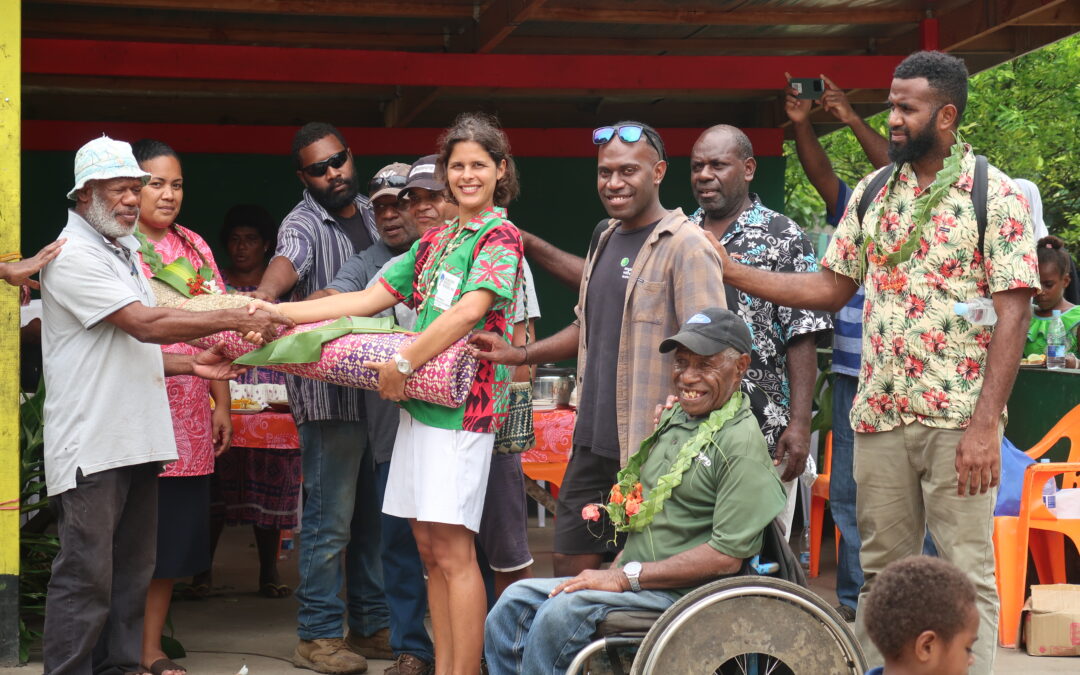Caption: A launch ceremony for the Erakor Bridge community toilet held in October 2022. The ceremony was attended by community partners including the Vanuatu Ministry of Health, the Vanuatu Society for People with Disability, the Shefa Provincial Government Council, UNICEF and a local school.
For environmental activist David Kalsal, fishing and swimming in the Emten Lagoon on Vanuatu’s Efate Island has always been a part of local life for him and his family. In recent years however, the lagoon has also become an indicator of how climate change and sanitation challenges are impacting his community.
The Erakor Bridge community lies on the edge of the Emten Lagoon and is home to approximately 200 residents. The community consists of low-lying areas with a high groundwater table, meaning the area is especially vulnerable to cyclones and frequent flooding during periods of heavy rainfall. As a result of flooding and inadequate household sanitation systems, swimming and fishing is no longer safe for the community due to high levels of e.coli bacteria detected in the lagoon.
‘The [flood] water that ends up in the lagoon collects sediment, debris and, due to poor sanitation systems, human faeces,’ says David.
Ni-Vanuatu communities like David’s are on the frontline of the climate crisis and are already experiencing firsthand the effects of climate change.
‘We have seen so many things happening already around us that have a direct link to climate change… flooding, rising sea levels, coastal erosion, loss of marine life and biodiversity,’ David says. ‘When I was a little kid living here, the lagoon was filled with plantations of mangroves and an abundance of marine life. Now, we no longer have these things.’
With rainfall projected to increase by 8-9mm by 2030 due to climate change, the Erakor Bridge community was urgently in need of a sanitation solution which could withstand these challenging conditions and safeguard the community from the health risks posed by inadequate sanitation systems.
A conversation between David and the EWB Australia in Vanuatu team in 2020 led to two years of extensive community consultation and the construction of a community compost toilet that survived not one, but two cyclones, in March this year.
Origins of the project
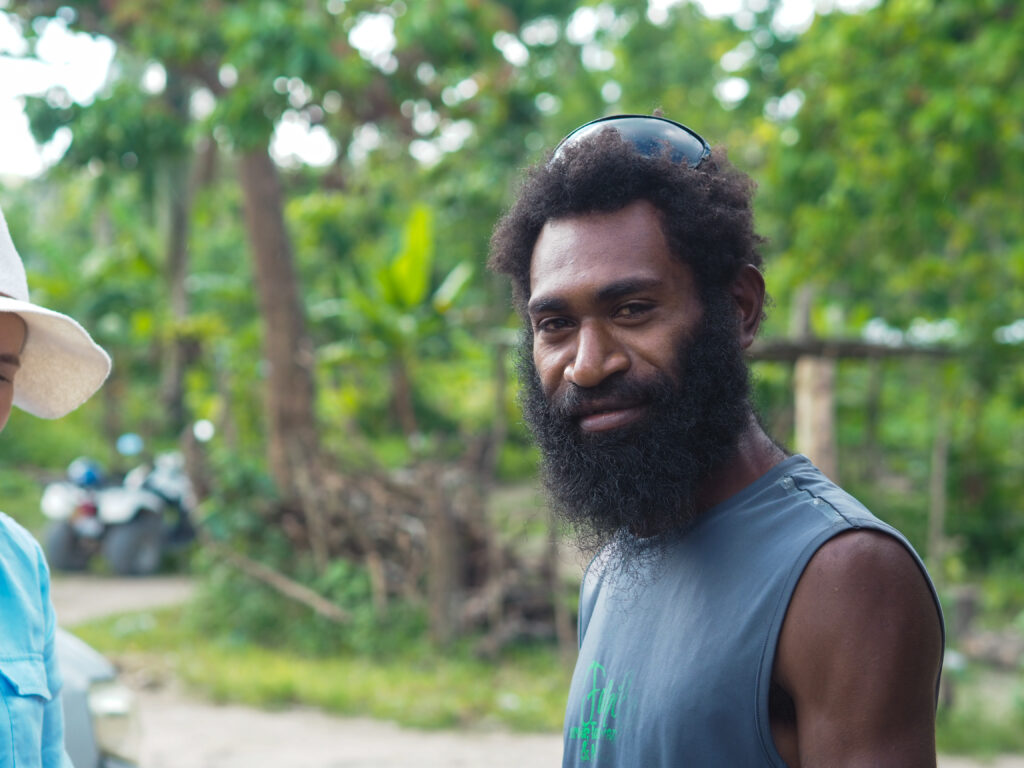
David Kalsal, Erakor Bridge community member
In 2020, David and other environmental activists raised the idea of a community accessible compost toilet with EWB Australia in Vanuatu. The EWB team began designing and prototyping a toilet facility that is adjacent to the community hall, which would be accessible to everyone in the Erakor Bridge community and suitable to the local environment.
The community had never had access to a public toilet; the high groundwater table coupled with increasingly heavy rainfall meant that household solutions such as pour flush toilets and dry pit toilets had failed in the past. Extensive community consultation was crucial to developing a solution that would meet local needs, withstand environmental challenges and could be sustained in the long run.
The team, led by EWB’s Technical Program Manager Steve Tarimaemae, began developing a prototype with input from the local community, with David Kalsal acting as a community advocate throughout the process. This was intended to be a long-term project extending to 2025, allowing for thorough consultation prior to building the toilet as well as subsequent monitoring and maintenance.
Designing a community-oriented solution
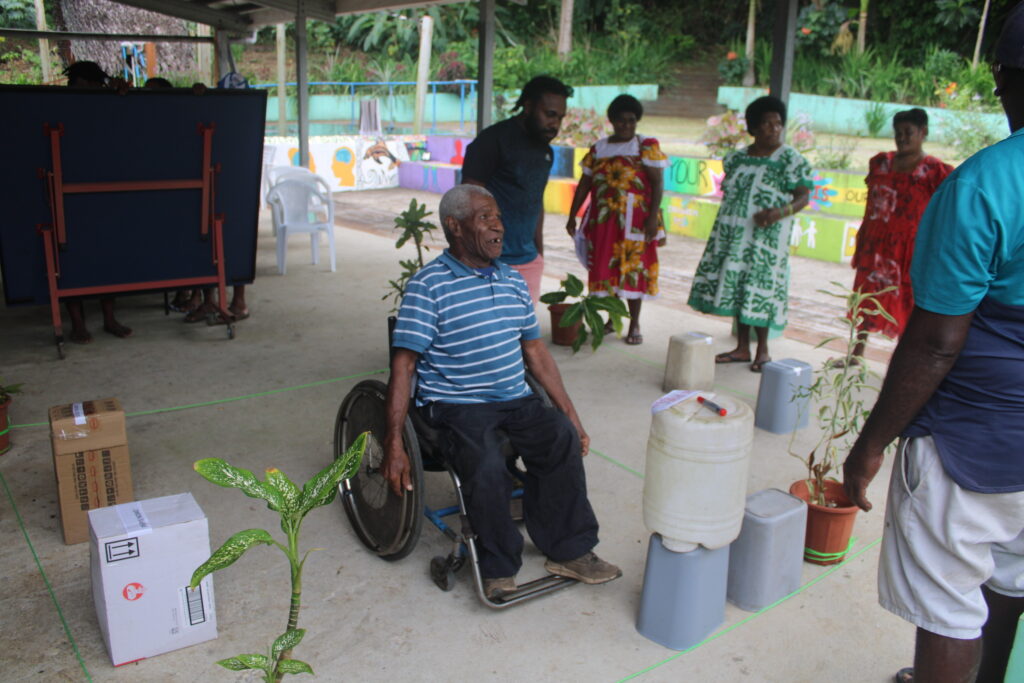
The EWB Australia in Vanuatu team holding concept exploration workshops with local community partner, The Vanuatu Society for People with Disability.
While exploring and designing options for the compost toilet, the team prioritised sustained and meaningful engagement with the local community. This was key to understanding beneficiaries’ needs, exchanging knowledge about the local environment and ensuring a long-lasting and sustainable solution.
The team engaged with the community through a 2021 awareness program around pollution levels and sanitation guidelines, holding focus groups to canvas community input. EWB also has a long-term relationship with Vanuatu’s Ministry of Health through a collaborative effort in developing national hygiene and sanitation guidelines and standards.
In accounting for accessibility needs and the inclusion of vulnerable groups, the team consulted with the Vanuatu Society for People with Disability, concentrating in particular on ensuring access to the toilet for a wheelchair user in the community.
Following extensive community consultation and prototyping, the team settled on a design for a raised dual-pit compostable toilet, which was launched at a ceremony in October 2022 attended by the Vanuatu Ministry of Health, the Vanuatu Society for People with Disability, the Shefa Provincial Government Council, UNICEF and a local school.
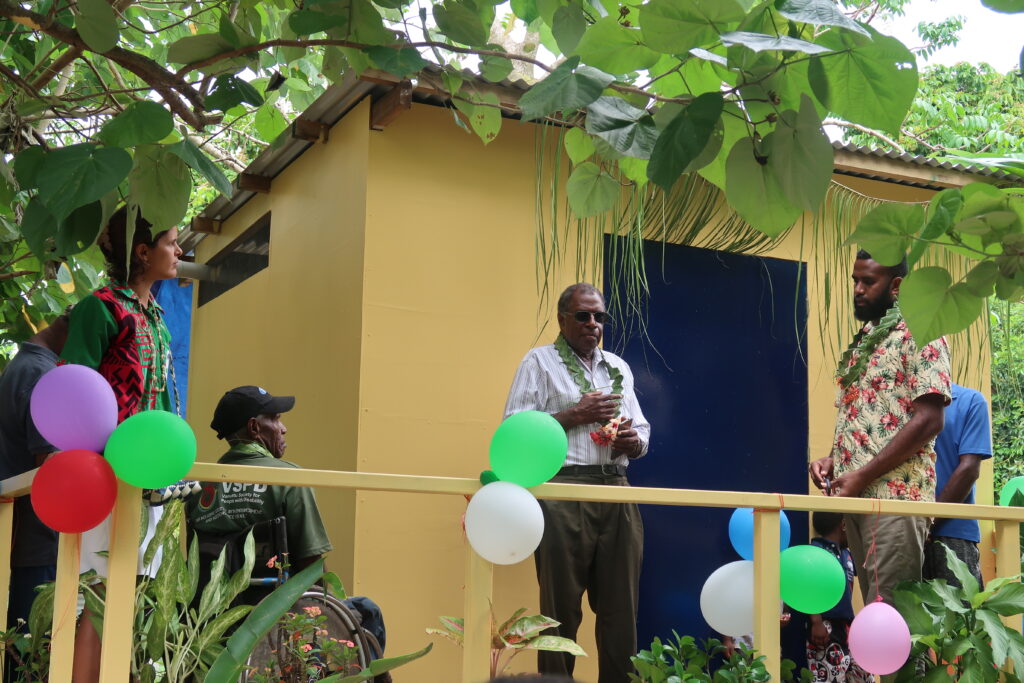
The launch ceremony held in October 2022.
The toilet has separate pits for urine and faeces, with a soak away system for urine. A key benefit of the toilet is that once the faecal matter dries out sufficiently, it can be repurposed as a source of fertiliser. The toilet has been built 1.1 metres high, thus preventing flooding from washing out waste into the surrounding environment, which has caused health risks in the past. A gravity-fed rainwater tank has also been installed to provide water for handwashing.
David says, ‘After two dedicated years of working on and developing this concept, this year, we finally built it. I am so proud, as this is the first of its kind to be prototyped in my community.’
Long-term sustainability and next steps
Ensuring the long-term sustainability of the facility was a key focus for the EWB team. Any solution had to be able to be maintained within the community and be suitable to meet the community’s needs on an ongoing basis.
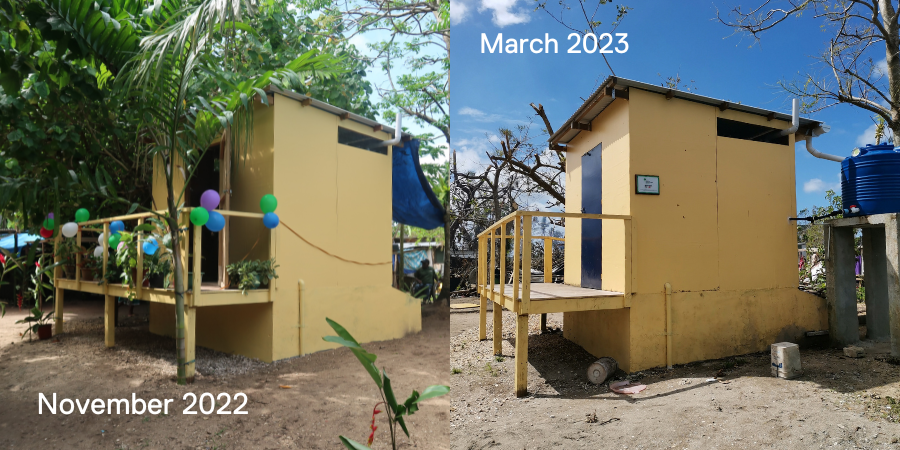
The community toilet before and after damage to the local area caused by Cyclones Judy and Kevin.
This was put to the test when Vanuatu was hit by back-to-back tropical cyclones, Cyclones Kevin and Judy, in February and March this year. Despite significant damage to the area, the compost toilet survived intact – a result of its careful construction in this challenging environment.
Going forward, the EWB team is working with the Erakor Bridge community to ensure they can independently manage the toilet on an ongoing basis. A community committee has been trained on operating and maintaining the toilet, including regularly adding sawdust to the toilet, emptying the rubbish bin and cleaning the floor. Once the pit is full, the EWB team will assist the committee to safely empty and dispose of the compost within the community.
The team has extensive monitoring work planned for the next two years, aiming to understand the optimal safety protocols for managing and possibly re-using waste. This has been a key issue with previous compostable toilet projects in Vanuatu. The team is also in the process of exploring ways to scale the solution at a household level by producing a low-cost design that can be implemented by individual families.
David looks forward to further collaboration to help build the community’s resilience to the environmental challenges that lie ahead.
“We are looking forward to continuing to work with Engineers Without Borders… so that every household can adapt this system.”
As a lifelong resident of Erakor Bridge, David’s work as an advocate is bringing his community one step closer to ensuring they can continue to call this place home.


